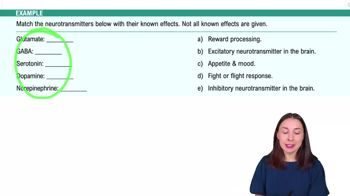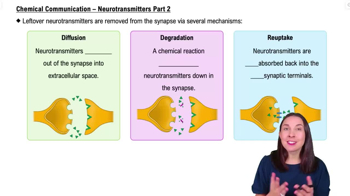Table of contents
- 1. Introduction to Psychology1h 43m
- 2. Psychology Research2h 20m
- 3. Biological Psychology2h 41m
- 4. Sensation and Perception28m
- 5. Consciousness and Sleep32m
- 6. Learning41m
- 7. Memory34m
- 8. Cognition37m
- 9. Emotion and Motivation35m
- 10. Developmental Psychology33m
- 11. Personality48m
- 12. Social Psychology41m
- 13. Stress and Health41m
- 14. Psychological Disorders44m
- 15. Treatment47m
3. Biological Psychology
Communication in the Nervous System
Struggling with Psychology?
Join thousands of students who trust us to help them ace their exams!Watch the first videoMultiple Choice
Neurons fire
A
stronger when there is a strong stimulus.
B
either full strength or not at all.
C
partially when there is a weak stimulus.
D
partially when there is a strong stimulus.
 Verified step by step guidance
Verified step by step guidance1
Understand the concept of the 'all-or-none' principle in neural firing, which states that a neuron either fires at full strength or not at all.
Recognize that the strength of a stimulus does not affect the strength of the action potential; instead, it affects the frequency of firing.
Identify that a strong stimulus can cause neurons to fire more frequently, but each individual action potential remains at full strength.
Consider that a weak stimulus may result in fewer action potentials, but each one is still at full strength.
Conclude that neurons do not fire partially; they either fire completely or not at all, regardless of the stimulus strength.

 1:20m
1:20mWatch next
Master Electrochemical Communication with a bite sized video explanation from Hannah Gordils
Start learningRelated Videos
Related Practice
































